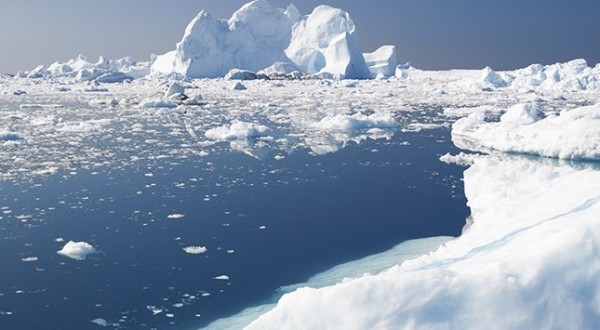A new report issued by the Arctic Monitoring and Assessment Programme, warns that even if the world manages to keep global warming below the targeted 2°C threshold, some of the Arctic ice shifts, resulting from climate change, could be permanent. By 2030, the Arctic Ocean may be ice-free, pushing seas to more extreme heights.
Key Findings
- The Arctic’s climate is shifting to a new state : Rising concentrations of greenhouse gases are driving widespread changes in the Arctic’s sensitive climate, hydrological, and ecological systems. Since 2011, downward trends have continued in sea ice thickness and extent, land ice volume, and spring snow cover extent and duration. The Arctic Ocean could be largely free of sea ice in summer as early as the late 2030s, only two decades from now.
- Climate change in the Arctic has continued at a rapid pace : The Arctic was warmer from 2011 to 2015 than at any time since instrumental records began in around 1900, and has been warming more than twice as rapidly as the world as a whole for the past 50 years. In addition, the area and duration of snow cover are decreasing. Snow cover has continued to decline in the Arctic, with its annual duration decreasing by 2–4 days per decade. Permafrost warming continues. Near-surface permafrost in the High Arctic and other very cold areas has warmed by more than 0.5°C since 2007–2009.
- Changes will continue through at least mid-century, due to warming already locked into the climate system : Models project that autumn and winter temperatures in the Arctic will increase to 4–5°C above late 20th century values before mid-century, under either a medium or high greenhouse gas concentration scenario. This is twice the increase projected for the Northern Hemisphere. These increases are locked into the climate system by past emissions and ocean heat storage, and would still occur even if the world were to make drastic near-term cuts in emissions.
- Substantial cuts in global greenhouse gas emissions now can stabilize impacts after mid-century : Compliance with the Paris Agreement will stabilize snow and permafrost losses, but there will still be much less snow and permafrost than today. Efforts to control greenhouse gas
emissions can have a major impact on sea-level rise after mid-century. However, the Arctic will not return to previous conditions this century
under the scenarios considered in the SWIPA 2017 assessment.
- Adaptation policies can reduce vulnerabilities : The near inevitability of accelerating impacts in the Arctic and globally between now and midcentury reinforces the urgent need for local and regional adaptation strategies that can reduce vulnerabilities and take advantage of opportunities to build resilience.
- Effective mitigation and adaptation policies require a solid understanding of Arctic climate change : Reducing knowledge gaps will improve
our ability to respond to current and future changes in the Arctic. Coordination across monitoring efforts, modeling studies, and international
assessments can facilitate information-sharing and avoid duplication of effort.
“The Arctic is still a cold place, but it is warming faster than any other region on Earth. Over the past 50 years, the Arctic’s temperature has risen by more than twice the global average. Increasing concentrations of greenhouse gases in the atmosphere are the primary underlying cause: the heat trapped by greenhouse gases triggers a cascade of feedbacks that collectively amplify Arctic warming” the AMAP experts note.
Recommendations
- Limit Future Change : The Arctic states, permanent participants, and observers to the Arctic Council should individually and collectively lead
global efforts for an early, ambitious, and full implementation of the Paris COP21 Agreement, including efforts to reduce emissions of short-lived climate forcers.
- Adapt to Near-Term Impacts : The Arctic Council and other international organizations should prioritize research and knowledge-building efforts leading to enhanced certainty in predictions of changes and their consequences at local to global scales, facilitating the development of
effective adaptation responses to changes in the Arctic cryosphere.
- Support the Advancement of Understanding : The Arctic Council should continue its efforts to monitor, assess, and understand Arctic climate change and its implications. It should also support and interact with efforts of international organizations and conventions such as IPCC, WMO, the UNFCCC, and the Convention on Long-Range Transboundary Air Pollution (CLRTAP) to promote the inclusion of Arctic perspectives in their work.
- Raise Public Awareness of the Implications of Changes in the Arctic Cryosphere : The Arctic Council, permanent participants, and observers to the Council should prioritize informing and educating the public about observations, projections, and implications of Arctic climate change.
Further details may be found by reading the full report:

































































